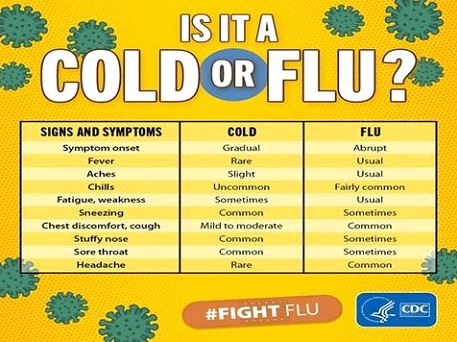What is common cold?
Common colds are viral infections of upper airway which can worsen causing lower airway disease as well. There are more than 200 types of viruses that can cause common cold, but Rhinoviruses are the most common type.
The most concerning common cold is flu infection caused by influenza virus.
During the Pandemic, the main concern is catching Coronavirus infection and COVID-19 pneumonia.
Please share your symptoms with our team if it is bothering you. Earlier contact with our team is valuable as the prevention and treatment decisions can be made during initial stages.
Why is it so important for me?
These common colds are the most frequent reason for missed school days and workdays. It spreads rapidly among the family members and in friend circles if one member has common cold. Therefore, it becomes important to avoid close contacts, cover sneeze/cough, and take a break from work or school if symptoms get worse including persistent fever or shortness of breath. Usually, patient with common cold do not realize how dehydrated they get during illness, so it is very important to keep yourself hydrated.
What are the risk factors?
The major risk factors include:
- Close contact with patients having common cold symptoms.
- Season (common during fall and Winter, but you can catch cold any time of the year)
- Age: Infants and young children have more common colds per year as compared with adults.
What are the common symptoms of common cold?
Below mentioned are the most common cold symptoms:
- Headache
- Sneezing
- Runny nose or stuffy nose
- Sore throat
- Cough
- Mucus dripping down your throat
- Watery eyes
- Fever, though most people do not have any fever.
When to call Nibbana Healthcare Services?
Not all common cold causes significant infection. Most of the infections are asymptomatic or with mild symptoms. Most of the infections recovers in the matter of 3-7 days as your natural immunity fights off the viral infections.
Sometime the immune system can get overwhelmed and causes severe symptoms suggesting that you seek medical help. Call our team if you experience these warning symptoms:
- Difficulty in breathing
- Fever lasts>4 days
- Symptoms > 7-10 days without any improvement
- Symptoms such as fever or cough that improves initially but returns with worse symptoms.
- Worsening of chronic medical conditions
What are different ways to prevent or treat common cold?
| Prevention | Treatment |
|---|---|
| Wash your hands | Most common colds recover itself |
| Avoid contact with sick people | Keep yourself hydrated |
| Cover your cough or sneeze | Use steam inhalation |
| Avoid touching eyes, nose, mouth with unwashed hand | Use lozenges |
| Do not smoke and avoid secondhand smoke | Ask our team if over the counter (OTC) medication is appropriate for you |
| Age-appropriate Tylenol can be used in case of headache and fever |
NB: As we know most common cold infections are caused by viruses and they do not require any antibiotics. Antibiotics only help treat infection caused by bacteria. The early warning signs as mentioned above could be an early indication of developing bacterial infection. In case of exposure to known Flu patient, please contact our team immediately, because there are few antiviral medications that can be used to prevent and treat early symptoms as these antivirals are effective if given within 48 hours.
Is there any vaccine for common cold?
Usually there is no good vaccine for common cold viruses. But there are good options of vaccines available for prevention of Flu infection. Please reach out Nibbana Healthcare team during fall or early winter to get more information about the type of vaccine. It is important to note that these Flu vaccines are the not 100% protective. They cannot reduce the risk of infection to zero but helps significantly reduce the severity and duration of symptoms and if taken appropriately prevents hospitalizations as well.
How do I know if I have common cold or Flu?
Shown below is an easy view to tell the difference. Make note that these differences are not absolute, and it must be read in the exposure context. If you are having common cold symptoms and you are exposed to person with diagnosed Flu infection, it is more than likely to be Flu infection rather than common cold. So, please call our team if you are have concerning symptoms.


